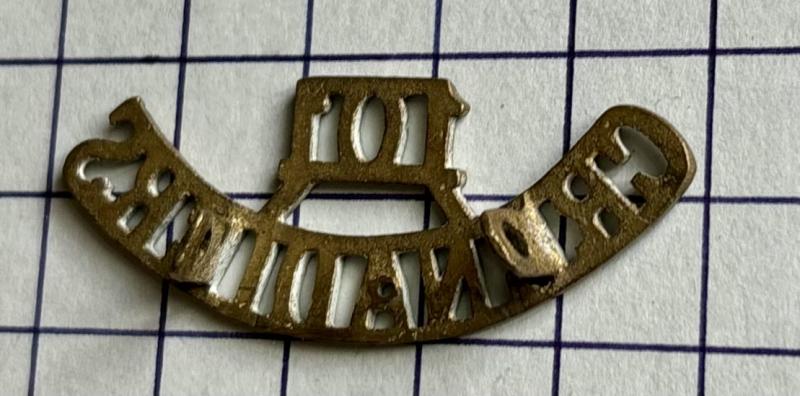c1903-1922 101st Grenadiers Regiment Indian Army Brass Shoulder Title
101st Grenadiers India cast brass metal with integral loops st, cWW1. VGC.
The First World War began in August 1914, a war that pitted the British Empire, France and their Allies against Germany and its allies. During the conflict, the Regiment saw service in Africa and the Middle East. The 101st raised a 2nd Battalion in 1917 which saw service in Egypt; it was disbanded in 1921.
The Regiment took part in operations in German East Africa from the beginning of the campaign there in November 1914. There, the British encountered a formidable opponent in the form of Paul Erich von Lettow-Vorbeck. The 101st took part in the initial landings and the Battle of Tanga. This was a German victory, that saw the British and Indian forces, including the 101st, sustain significant casualties that compelled them to retreat back to their ships. The 101st had however shown stubborn resistance when other units broke.
In January 1915, a company of the 101st took part in the Battle of Jassin that saw both sides sustain heavy casualties which compelled von Lettow-Vorbeck to avoid pitched battles with the British forces. Due to this defeat, the British garrison in Jassin surrendered, after no relief force had arrived, with nearly 300 British and Indians troops taken prisoner, including the company of the 101st, but were subsequently released on parole with the pledge that they would have no further participation in the war.
One company of the Regiment acted with the 5th Light Infantry in another attempt to capture Tanga in July 1916. The port—which had, for the most part, been abandoned—was, indeed, successfully captured. Some of von Lettow-Vorbeck's forces had remained to snipe at the Indian forces; these snipers proved to be quite a deadly nuisance that required intense patrolling to remove the threat. For the Regiment's involvement in the campaign it was awarded the Theatre Honour "East Africa 1914–16".
The 101st later saw service in the Middle East in the Palestine theatre – this theatre was the second largest, in terms of troop numbers, after the Western Front. Their opposition was the Ottoman Empire that controlled Palestine, and was an ally of Germany. The Regiment took part in the attempts to capture the important port of Gaza and by the end of December 1917 the Allies were in control of much of Palestine, including the symbolic capture of Jerusalem. In July 1918 the Regiment took part in the Ghurabeh raid that saw intense fighting and over 100 Ottomans taken prisoner. The Regiment later took part in the Megiddo Offensive – the World War I equivalent of the German Blitzkrieg during World War II – and took part in the attempts to capture Nablus. The Ottomans signed an Armistice with the Allies on 30 October. The First World War finally ended on 11 November 1918 with the signing of the Armistice between the Allies and Germany.
Soon after the war, the regiment deployed to British Somaliland, where operations against Hassan and his followers had resumed. The campaign, which encompassed the army, Royal Navy, and Royal Air Force, succeeded in defeating Hassan in 1920, after two decades of conflict.
In accordance with the Indian Army reforms of 1922, the 101st amalgamated with five other regiments to form six battalions of the 4th Bombay Grenadiers; the 101st became the 1st Battalion of the new regiment.
Code: 272
27.00 GBP


